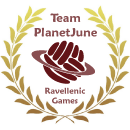There’s been much talk lately about how to share on Pinterest properly: giving credit to the source of your image, and making sure the pin actually links back to the source correctly before you re-pin it. I have an excellent example of why this is so important. Yesterday, I suddenly got a massive traffic spike […]

PlanetJune Craft Blog
Latest news and updates from June
Archive for November 2011
November update
A quick newsy post today, with a new winner, a new name, and a new deal: Review and Win contest October’s ‘Review and Win’ winner is Holly M, with her Detail Stuffing Tool review: I make a lot of stuffed toys (some crochet, some sewn) and this is the only stuffing tool I’ve ever tried […]














